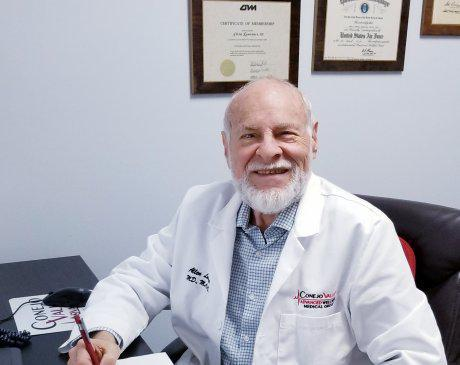- 21103 Vanowen St Woodland Hills, CA 91303 | Call us today!
- 310-879-9266
Hormone Replacement Therapy (HRT) and Mammograms Risks, Benefits, and General Information for Women

Female Hormone Replacement Therapy (HRT) is a common treatment for alleviating symptoms of menopause such as hot flashes, night sweats, and vaginal dryness. While HRT can significantly improve quality of life for many women, it is important to understand its implications, especially concerning breast health and the need for regular mammograms. This article provides a comprehensive overview of HRT, its benefits and risks, and crucial information about mammograms for women considering or currently using HRT.
What is Hormone Replacement Therapy (HRT)?
HRT involves the administration of hormones, typically estrogen (estradiol) and progesterone and occasionally testosterone, to replace those that her body no longer produces after menopause. There are many different types of HRT:
- Estrogen-Only HRT: Generally this is only prescribed for women who have had a hysterectomy, with or without the ovaries being removed.
- Combined HRT: Includes both estrogen and progesterone, prescribed for women who still have their uterus. Since her uterus is still in place it is being used to prevent endometrial cancer.
- Combined HRT along with Testosterone:
- When estrogen and progesterone alone do not fully manage menopausal symptoms.
- When androgen deficiency symptoms exist, such as decreased libido, fatigue, and diminished well-being. Testosterone improves sexual function, enhance libido and increases sexual satisfaction.
- Testosterone also combats fatigue and improves overall energy levels.
- Testosterone enhances mood, increases total well-being, and protects cognitive functioning.
Benefits of HRT
- HRT offers many physical benefits, including:
- Relief from Menopausal Symptoms: HRT is highly effective in reducing hot flashes, night sweats, and vaginal dryness.
- Bone Health: HRT also helps to prevent osteoporosis and reduce the risk of fractures.
- Mood and Sleep: Some women experience improved mood and sleep patterns while on HRT.
Risks of HRT
- While HRT has its benefits, it also carries potential risks:
- Breast Cancer: Studies have indicated that long-term use of combined synthetic HRT maybe associated with an increased risk of breast cancer. The risk appears to increase with the duration of HRT use.
- Cardiovascular Disease: HRT may increase the risk of heart disease, stroke, and blood clots, particularly in older women or those who start HRT several years after menopause.
- Other Risks: There may be an increased risk of gallbladder disease and certain types of cancer, such as ovarian and uterine cancer, with excessive HRT or unopposed HRT use.
HRT and Mammograms
Given the question of potential increased risk of breast cancer with HRT, it is crucial for women on HRT adhere to regular mammogram screenings schedule. Here are some key points to consider:
- Increased Breast Density: HRT can increase breast density, which can make mammograms more difficult to interpret. Dense breast tissue can mask tumors, making early detection harder.
- Screening Frequency: Women on HRT should discuss with their healthcare provider how often they should be having mammograms. Generally, an annual mammogram is recommended, but more frequent screenings may be advised based on individual risk factors.
- Timing of Mammograms: It may be beneficial to schedule mammograms at a time when breast tissue is less dense. Some providers recommend halting HRT for a short period before performing the mammogram in order to reduce breast density and improve the accuracy of the screening.
- Personalized Risk Assessment: Women should have a personalized risk assessment done by their healthcare provider to determine their individual risk of breast cancer and their appropriate mammogram schedule.
General Information for Women on HRT
- Informed Decision: Women considering HRT should have a thorough discussion with their healthcare provider about the benefits and risks, considering personal health history and risk factors.
- Lifestyle Factors: Maintaining a healthy lifestyle, including a balanced diet, regular exercise, and avoiding smoking and excessive alcohol use, both of which can help mitigate some of the risks associated with HRT.
- Regular Check-ups: Regular medical check-ups and open communication with their healthcare providers are both essential for women on HRT to monitor their health and make any and all necessary adjustments to their HRT treatment program.
Testosterone and Breast Cancer Risk:
The relationship between testosterone therapy and breast cancer in women is not well-defined. Some studies suggest that elevated androgen levels may be associated with an increased risk of breast cancer, while others show no significant link. Ongoing research is needed to clarify this relationship.
Testosterone and Mammography:
Testosterone therapy can influence breast tissue, potentially affecting mammogram results. Women undergoing testosterone therapy should inform their radiologist, as changes in breast density could impact the interpretation of mammograms.
Monitoring and Screening:
Women on testosterone therapy, especially when combined with estrogen and progesterone, should adhere to regular mammography screenings. This ensures early detection of any potential breast abnormalities, given the complex interplay of hormones and breast tissue changes.
Clinical Guidance:
As we have discussed above, Testosterone solves several very important and key problems relating to menopause hence it may be an essential part of any HRT program. For this reason it is crucial for women considering or currently using testosterone therapy to have individualized risk assessments for breast cancer as well as negative side effects of testosterone in women.
HRT can be a valuable treatment for managing menopausal symptoms and improving quality of life. However, it is essential for women to understand the associated risks, particularly regarding breast health and the need for regular mammograms. By working closely with their healthcare providers, women can make informed decisions about HRT and ensure they receive appropriate screenings to maintain their overall health.
Remember, and this is important, the majority of breast cancers are found earliest by women doing self-breast exams and next by women who are undergoing practitioner performed breast exam. The combination of all three started early and done in the following pattern:
- Self-Breast Exam done Monthly, from puberty on, till the day you die
- Physician Manual Exam done yearly, every year.
- Mammograms done between 25 years of age and 40 years of age every 2 years, and then after 40 years of age, done yearly
- Breast Ultrasounds done yearly in women with dense breasts
For more information, women should consult their healthcare provider and consider resources from reputable organizations such as the American Cancer Society and the North American Menopause Society.

Article by Dr. Allen Lawrence, M.A., M.D., Ph.D.




